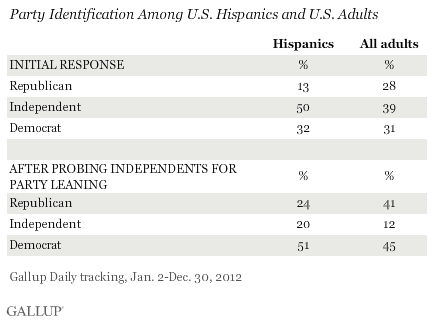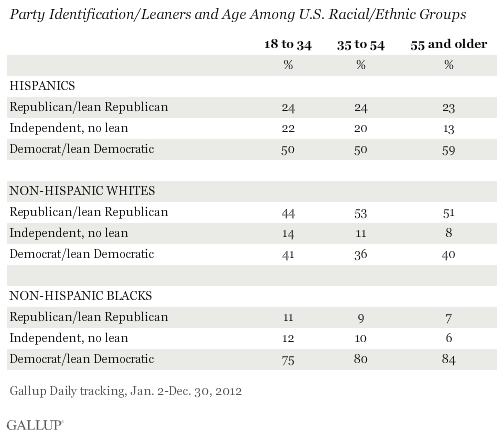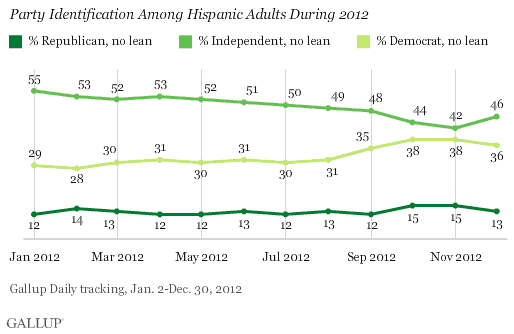WASHINGTON, D.C. -- U.S. Hispanic adults are more than twice as likely to identify as or lean Democratic than Republican, according to Gallup Daily tracking data collected throughout 2012. In total, 51% of Hispanics identified as or leaned Democratic, while a little less than a quarter (24%) identified with or leaned toward the GOP. Twenty percent were wholly independent, with no preferences for either party.

The results are based on Gallup Daily tracking data with 26,264 Hispanics collected from Jan. 1 to Dec. 31, 2012. The politics of the U.S. Hispanic population are becoming increasingly important to the future of both political parties, as the size of this group continues to grow. Many analysts say a strong, Democratically skewed Latino turnout is an important reason for President Barack Obama's re-election victory in November of last year.
Asked initially about political party identification, half of Hispanics (50%) identify as independent/other or are unsure. Thirty-two percent of Hispanics are outright Democrats and 13% are outright Republicans. The Democratic Party clearly enjoys a comfortable advantage in terms of party identification over its rival, the GOP, among Hispanic voters. However, this Democratic edge may not necessarily be permanent, as 50% of Hispanic voters initially identify with neither major political party. However, when accounting for "leaners," -- independents who prefer one party over the other -- 51% of Hispanics identify or lean with the Democratic Party and 24% opt for the Republican Party. For comparison, 79% of blacks identify with or lean toward the Democratic Party.
The Future of the Hispanic Vote May Be Just Like the Present
It has become a political truism that Hispanic voters played an influential role in the 2012 presidential election and, consequently, there has been a growing focus among both major parties, but especially the currently disadvantaged Republican Party, to find ways to appeal to Hispanic voters. Central to any outreach effort will be young Hispanic voters -- those aged 18 to 34 -- who make up 47% of all Hispanic adults, by far the largest of three specific adult age groups analyzed.
Half of young U.S. Hispanic adults (50%) identify with or lean toward the Democratic Party, while slightly less than a quarter (24%) identify as or lean Republican. Another 22% are "pure" independents. Furthermore, young Hispanic adults appear to have political preferences not too dissimilar from their older counterparts', although Hispanics aged 55 and older are slightly more likely to identify with or lean toward the Democratic Party and slightly less likely to identify as pure independents.

There is a higher probability that young Hispanics were born in the U.S. than is true of the older generations. Fifty-two percent of 18- to 34-year-olds were born in the U.S., while that figure is 44% for 35- to 54-year-olds and 46% for those aged 55 and older. An earlier Gallup analysis found that U.S.-born Hispanics are more likely to be Republican, though that effect is not particularly noticeable when one looks at party identification/leanings for 18- to 34-year-olds.
In all, majorities or near-majorities across all age groups among Hispanic adults identify with or lean toward the Democratic Party, including 50% of middle-aged Hispanics and 59% of older Hispanics.
Hispanic adults more closely resemble non-Hispanic blacks rather than non-Hispanic whites in terms of having a cohesive political identity that remains intact across all age groups. While Hispanics do not identify with or lean toward the Democratic Party to the same degree that blacks do, there are few generational differences among Hispanics and among blacks. Democratic identification significantly outweighs Republican identification across all three age groups.
Young non-Hispanic whites, meanwhile, are more evenly divided in their political loyalties, with 44% identifying as or leaning Republican and 41% seeing themselves as Democrats or leaning Democratic. However, the middle-aged and older generations among whites strongly back the Republican Party at majority-support levels. For white Americans, 52% of those aged 35 to 54 and 51% of those aged 55 and older identify as or lean Republican.
The key issue looking ahead is the future political identification of the large group of young Hispanics as they age. If the political preferences of their middle-aged and older counterparts are any guide, it appears that young Hispanic adults will remain lopsidedly Democratic throughout their lives. There is also no generational evidence at this point suggesting that they will become more Republican. Indeed, given the stability of political preferences across the three adult age groups, it is reasonable to project that new Hispanic adults -- those who turn 18 in the coming years -- will continue the Democratic Party's advantage among this group.
More Hispanics Became Democrats in 2012
As was the case among all Americans, the Democratic Party made substantial gains among Hispanic adults over the course of 2012, in terms of "hard" political identification -- that is, those admitting outright affiliation with a party. In January 2012 -- well before the November election -- 29% of Hispanics saw themselves as Democrats. This spiked to 38% in November, before falling slightly to 36% in December.
While it is not unusual for party identification to increase ahead of an election as political preferences intensify, this effect had virtually no impact on the percentage of Hispanics identifying as Republicans. Hispanics moved toward Democratic identification at a faster rate than the overall adult population. And, among all American adults, as the number of independents/other fell, both parties saw marginal gains, though the Democratic Party modestly outpaced the GOP. Among Hispanics, however, only Democratic identification increased as the percentage independent fell over the year, suggesting some political independents or agnostics were now becoming Democrats.

Implications
The Democratic Party currently enjoys a significant lead in party identification among U.S. Hispanic adults. This advantage also appears to have intensified over the course of 2012, though this in large part likely reflects the general party identification patterns that affected all Americans during the election year. Factoring in Hispanic adults who lean toward a party but do not initially identify with that party, the Democrats have an especially robust advantage over the GOP among Hispanics -- a factor that may very well have shaped the outcome of the 2012 presidential election.
As Republicans consider ways to increase their appeal among Hispanic adults, it is worth noting that Republicans made little progress over 2012 in terms of winning new Hispanic supporters, while the Democratic Party made noticeable gains. Perhaps even more worrisome for the GOP is its poor performance among young Hispanic adults. While the GOP is not particularly popular with any Hispanic age groups, those aged 18 to 34 constitute almost half of the overall Hispanic adult population. Indeed, they are the engine of the Hispanic vote and its future. Gallup's data indicate that this picture is not going to get any brighter for the Republicans on its own, merely by virtue of generational shifts. Despite the higher rate of U.S. nativity among young Hispanics compared with those 35 and older, young Hispanic adults are just as entrenched in the Democratic Party, thus perpetuating the high degree of difficulty Republicans face in trying to make inroads in this important and growing community.
Survey Methods
Results for this Gallup poll are based on telephone interviews conducted Jan. 2-Dec 30, 2012, on the Gallup Daily tracking survey, with a random sample of 338,703 adults, aged 18 and older, living in all 50 U.S. states and the District of Columbia.
For results based on the total sample of national adults, one can say with 95% confidence that the margin of sampling error is ±1 percentage point.
For results based on the total sample of 26,264 Hispanics, one can say with 95% confidence that the margin of sampling error is ±1 percentage point.
Interviews are conducted with respondents on landline telephones and cellular phones, with interviews conducted in Spanish for respondents who are primarily Spanish-speaking. Each sample includes a minimum quota of 400 cellphone respondents and 600 landline respondents per 1,000 national adults, with additional minimum quotas among landline respondents by region. Landline telephone numbers are chosen at random among listed telephone numbers. Cellphone numbers are selected using random-digit-dial methods. Landline respondents are chosen at random within each household on the basis of which member had the most recent birthday.
Samples are weighted by gender, age, race, Hispanic ethnicity, education, region, adults in the household, and phone status (cellphone only/landline only/both, cellphone mostly, and having an unlisted landline number). Demographic weighting targets are based on the March 2011 Current Population Survey figures for the aged 18 and older non-institutionalized population living in U.S. telephone households. All reported margins of sampling error include the computed design effects for weighting.
In addition to sampling error, question wording and practical difficulties in conducting surveys can introduce error or bias into the findings of public opinion polls.
For more details on Gallup's polling methodology, visit www.gallup.com.
